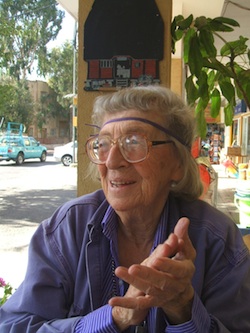By David Shayne, Special to JTNews
Several years ago, while listening to Israeli radio, I noticed the announcer was a crotchety sounding, elderly woman engaging in free-wheeling discussions with callers —also elderly and sometimes crotchety sounding. In between the calls she would play old Hebrew songs rarely heard on Israeli media these days. Intrigued, I paid attention more closely and learned I had tuned into “Netiva M’daberet ve Makshiva” — Netiva Talks and Listens. I quickly became a regular listener.
After a while, a lightbulb went on: Could this be the same woman I read about back in high school, who had fought so fiercely during Israel’s War of Independence that the Arabs called her the “Blond Devil”?
Dan Kurzman, in his wonderful book Genesis 1948, had interviewed her, along with hundreds of others, to tell the story of Israel’s founding through the perspective of the people who lived through those events. I pulled the book off the shelf and, sure enough, there she was: Netiva Ben Yehuda, a soldier of the Palmach, Jewish Palestine’s most highly trained and elite force, and, indeed, according to Kurzman, the “Blond Devil.”
Netiva died on February 28 at age 82. She leaves behind a unique legacy: She authored several books, was featured in a TV documentary, and logged hundreds of hours on the air. While never achieving more than “minor celebrity” status, many Israelis knew of her from her writings or her radio program.
Netiva was born in Tel Aviv on Tisha B’av in 1928. She joined the Palmach in 1946, while Palestine was still under British rule, and served until the war ended in 1949. She was briefly married and had one child, a daughter. In the ‘70s, living in Jerusalem, she co-authored the first official Dictionary of Hebrew Slang. In the early ‘80s, after having been erroneously diagnosed with a fatal illness, she wrote her memoirs of her experiences as a Palmach fighter.
In 1996, Netiva went on the air with her program. At least during the years I listened, she was joined by Raya Admoni, who presented the music, and her producer, Claude Buchbinder, who would direct the callers. She always opened with her theme song “Po Eretz Hemdat Avot” (Here is the Land of our Forefathers’ Yearning), an early Zionist anthem. After introductory remarks, during which she reminded the listeners that “here, we speak only of good things,” she would ask, “Do we have a listener, Claude?” and almost always there would be one.
Most — but not all — of the callers were of Netiva’s generation, many had been soldiers, and a few knew her personally. Often they would call to give her the sad news a comrade-in-arms had passed. Or a child of a soldier would call. Sometimes Holocaust survivors would call. One such caller told how she not only survived herself, but saved a friend by getting extra rations and skipping work shifts. She ended the call by stating how she got threefold revenge against the Nazis:
1) The tricks she pulled to keep herself and her friend alive,
2) The establishment of the State of Israel,
3) Her two sons and seven grandchildren, two of whom were now serving in the IDF.
Another caller told of how his brother had fought in one of the several pitched battles against the invading Syrians and was never seen again. Out of the blue, the IDF called to notify him that his brother’s remains had been identified in a mass grave in Rosh Pina, and 57 years after he fell in battle, the caller was finally able to bury his brother and say kaddish over his grave.
In between the calls, Raya would play music, only songs written (in Netiva’s words) “from the beginning of Zionism to the founding of the State.” The songs were mostly Hebrew, but she played some Yiddish, Ladino and Jewish liturgical music as well. I discovered many wonderful old songs that I would not have discovered but for the program.
Ultimately, Netiva’s program — or, as she would say, “not my program, but all of ours” — celebrated the sacrifice and heroism of Israel’s founding generation, but not just bygone times.
While Netiva’s program appealed largely to members of her generation and history buffs like me, she had young fans as well. Yaniv and his soldier friends once called to say they had just returned from a grueling exercise, and wanted, “y’know, some song about ‘eretz Yisrael hayafa,’” the beautiful land of Israel. After bantering with them for a while, Netiva closed by exhorting them to “keep watching over our homeland.”
“We’ll try,” Yaniv replied.
“You must, you have no other choice,” Netiva snapped back.
That, more than anything, sums her up.
Netiva’s passing is a painful reminder that her generation, those men and women who, in the words of Natan Alterman, constituted the “silver platter” upon which the Jewish State was presented to the Jewish people, is quickly disappearing from this world. She and all of her comrades will be missed.
